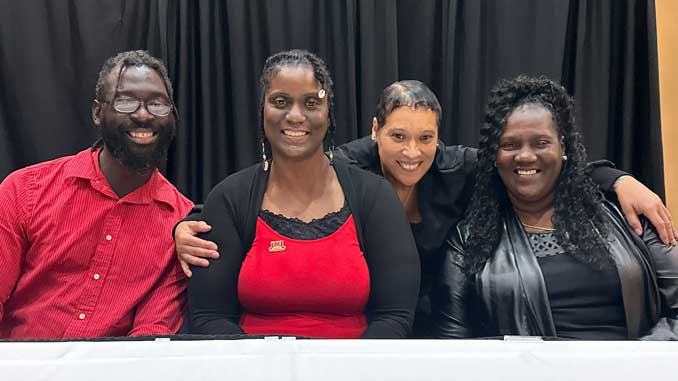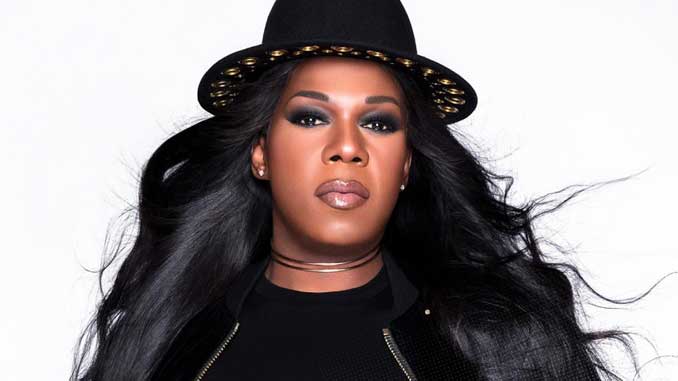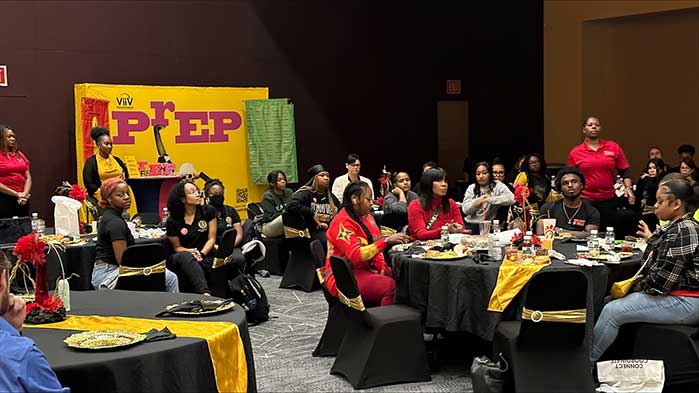
Story and Photos by Zora Thomas Data News Weekly Contributor
World AIDS Day, which is designated on Dec. 1st every year since 1988, is an International Day dedicated to raising Awareness of the AIDS Epidemic caused by the spread of HIV Infection and mourning those who have passed away from the disease. The red ribbon is the Universal Symbol of Awareness and support for people living with HIV. This year’s theme was “World AIDS Day 35: Remember and Commit,” which marked the 35th Year of deliberate focus and growth in the Field of Technological and Medicinal Advancements that allows those affected by HIV (Human Immunodeficiency Virus) and AIDS (Acquired Immunodeficiency Syndrome) to live their lives and continue to look to destigmatizing and breaking down stereotypes.
“We know that when it comes to HIV and AIDS that communities of color are particularly impacted, and particularly African Americans. We have to also look within our communities to make sure [of] that education,” said Chantel Gant, a Wellness Educator and a Counselor at the Office of Counseling and Wellness at Xavier University of Louisiana.
Around the world, over 39 million people live with HIV and in just 2022, 1.3 million people were newly diagnosed with HIV. The Center for Disease Control and Prevention (CDC) citing data from the Louisiana Department of Health and Hospitals ranked Louisiana 3rd in the U.S. in estimated HIV and AIDS case rates. The New Orleans Metropolitan Statistical Area (NOMSA) ranks 2nd in the U.S. for estimated HIV case rates and 5th for AIDS case rates, respectively.”

As part of efforts to bring awareness to the ongoing rates of infection, St. Thomas Community Health Center hosted a panel on World Aids Day to give voice to patients and medical professionals on Dec. 1st. Three New Orleans residents and natives, Tatania Riley, Lorraine Loydrake, and Brandon Brown, shared their journey as people living with HIV to help bring awareness and destigmatize people who live with HIV.
Brandon Brown, 40, a Mississippi native living in New Orleans for the past ten years is a Case Manager at St. Thomas Community Health Center, working to support others living with HIV. He was diagnosed twenty years ago. Tatania Riley, 45, served as a Counselor at Crescent Care, and was diagnosed when she was 14. Since then, she has had three children, two of them, Breeon Riley and Jania Edwards, joined her at the event. Breeon shared how her mother has been a hero to her and the pride she feels in seeing her share her story. Lorraine Loydrake, has been positive for over 20 years and in that time has been an advocate, a public speaker, and a former Board Member of Project Lazarus that now works at Priority Health Care.
Brown, Riley, and Loydrake said that over the years there has been a growth in treatment for people living with HIV. Their treatments have changed from having to take sometimes up to seven pills a day, to now only having to take one pill daily or getting one shot a month. Living a full life with HIV is something they shared they now advocate for to encourage others.

In 2020, the Institute of Women & Ethnic Studies was tasked by the New Orleans Film Society to create a film focusing on the experiences of five Black women living with HIV in the South, through funding from Gilead Sciences. Both Loydrake and Riley were featured in the 2020 film, “New Nickels,” which was directed by Iman Shervington, and explores the journeys of five Black women in an “Out of the Shadows” Program. This initiative focused on finding community, self-acceptance, and love.
“When I was in foster care, and that’s where I actually got it from. I was raped and molested in foster care. So that’s how I got it. But just being able to have a voice for somebody else because back then I didn’t,” Riley shared, recalling her story. “So, I knew it was other people out there that was afraid or ashamed to even have a voice. So, I want I have a voice for you,” she said.
A September 2022 report by the Louisiana Department of Health’s Office of Public Health ranked Louisiana 4th in the nation for HIV case rates and 11th in the estimated number of HIV cases. The Baton Rouge metro-area ranked 7th and the New Orleans metro-area ranked 9th for HIV case rates, among the large metropolitan areas in the U.S. Dr. George Nawas, a Xavier Clinical Assistant Professor, who serves as a member on the Louisiana Commission on HIV, AIDS & Hepatitis C Education Prevention and Treatment, appointed by Governor John Bel Edwards is part of a team reviewing the Impact of HIV Criminalization Laws in the New Orleans community, and especially among people of color. Such laws help to explain why people have remained in the shadows while living with the diseases, Nawas explained.
“We have to develop Patient Competency Programs to be able to help everyone understand [prevention],” Dr. Nawas said.
Nawas said this ranges from education on the proper use of condoms, explaining more of the HIV/AIDS treatment options that are typically known as PrEP, or Pre-Exposure Prophylaxis. PrEP is a highly effective treatment that reduces the chance of contracting HIV from sex or injection drug use, Nawas said adding that the types of PrEP available and recommended can be pills or shots.
Brown recalled how living in rural Mississippi there was a culture of keeping a diagnosis secret or hidden away. He shared that as an advocate, he added his HIV status to his dating profile to be open and transparent. This often-brought rejection and ridicule from friends and family, and even at church, Riley shared, recounting a time when she attended a church service and the pastor tried to shame those living with HIV. From those experiences each of them talked about their personal growth in their spirituality or faith as a result of learning to live with HIV. For Loydrake, her experience with HIV made her a firm believer through the mental and physical trials she faced, as well as continuing to be there for others.
The New Orleans area has a number of organizations and initiatives to help educate and combat discrimination for people living with HIV and to provide resources. Bounce to Zero is an Orleans Parish Initiative, with a goal “to reduce new HIV cases by 95 percent by 2030 and create a world with zero new HIV infections and zero people out of care.” Bounce Artist, Big Freedia, currently serves an ambassador of the initiative.
There was a patient who put his medication in a box and that box is under a floorboard. And that is under the bed. That is because he doesn’t want anyone to come home and see,” said Ian McCusker, the Planning and Training Coordinator for the New Orleans Regional AIDS Planning Council (NORAPC). “So, I was familiar with like stigma …. the stress that that takes. So just learning about what people are going through,” he added.
Kyada Jones’ son Zeandre Johnson passed at the age of 22, in January 2020. He was starting his third year at Texas A&M University and had been diagnosed with AIDS in 2018. Zeandre was a drum major, cheerleader, and section leader. Jones shared the story of her son on World Aids Day and talked about the importance of destigmatizing HIV and AIDS to allow people to feel comfortable enough to receive treatments.
Her and her husband at the time were in a panic initially at the diagnosis and went to the clinic to educate themselves on the options available to treat his diagnosis. Recalling how they would even go up to the school or call to make sure he was taking his medication. She urged those who plan on going in the field of medicine to come with an open heart.
“Z [Zeandre] was diagnosed with a rapid test and that’s when we were recommended to go to Crescent Care. It’s been a journey. We did everything as parents, to protect his best interests, he was very popular in high school and in college. Unfortunately, he didn’t take his meds because of the stigma,” Jones, said.
“He had the support from friends and family but because of the stigmas he didn’t want to share his personal life and of course he succumbed to it,” Jones added.
She hopes that in sharing her son’s story, those who work with people living with HIV would become more educated to provide both support and compassion.
“Times have changed, technology, and everything is still increasing. Unfortunately, my son was one of those kids who hid his virus,” Jones said. “So, I’d say again, for anyone who’s going to be a first responder, second responder, or third responder, they need to know that somebody cares outside of the people that’s sitting there.”
Recommended For You.



Be the first to comment